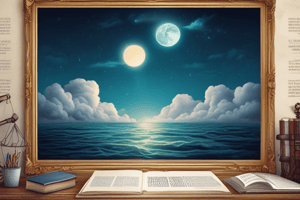Podcast
Questions and Answers
What does copyright protect from the moment of creation?
What does copyright protect from the moment of creation?
- Only artistic works
- All works created by an author
- Original intellectual creations (correct)
- Only published works
Which action is permissible under current photocopying guidelines for classroom use?
Which action is permissible under current photocopying guidelines for classroom use?
- Posting students' works online without consent
- Distributing copyrighted materials without permission
- Using any internet material freely
- Downloading and distributing newspaper articles for class discussion (correct)
What is a common misconception about internet materials and copyright?
What is a common misconception about internet materials and copyright?
- Only commercial websites are copyrighted
- All internet content is public domain
- Copyright does not apply to emails
- All material on the internet is copyrighted unless stated otherwise (correct)
What must educators do before posting student works on a school website?
What must educators do before posting student works on a school website?
Which statement about copyright infringement is true?
Which statement about copyright infringement is true?
What is the primary purpose of intellectual property protection?
What is the primary purpose of intellectual property protection?
Which of the following types of IP protection requires registration for easier validation in legal disputes?
Which of the following types of IP protection requires registration for easier validation in legal disputes?
What type of IP protection is specifically related to symbols, logos, and catchphrases?
What type of IP protection is specifically related to symbols, logos, and catchphrases?
What must a student do when using a creation licensed under CC BY?
What must a student do when using a creation licensed under CC BY?
Which type of IP protection prevents others from making or distributing an invention?
Which type of IP protection prevents others from making or distributing an invention?
What encompasses plagiarism in its broadest sense?
What encompasses plagiarism in its broadest sense?
What should you do to protect your IP before launching a product?
What should you do to protect your IP before launching a product?
Which statement accurately describes the nature of copyright?
Which statement accurately describes the nature of copyright?
What does intellectual property (IP) encompass?
What does intellectual property (IP) encompass?
How was the importance of protecting intellectual property perceived historically?
How was the importance of protecting intellectual property perceived historically?
Which of the following is NOT a type of intellectual property?
Which of the following is NOT a type of intellectual property?
What benefit does intellectual property protection provide to creators?
What benefit does intellectual property protection provide to creators?
Which is a common misconception about intellectual property protection?
Which is a common misconception about intellectual property protection?
What is the primary goal of intellectual property laws?
What is the primary goal of intellectual property laws?
What aspect of intellectual property relates to original ideas or concepts?
What aspect of intellectual property relates to original ideas or concepts?
Why might intellectual property violations occur more frequently now than in the past?
Why might intellectual property violations occur more frequently now than in the past?
Flashcards
Intellectual Property (IP) protection
Intellectual Property (IP) protection
Protecting your creations from copying or theft to foster innovation and benefit more people.
Copyright
Copyright
Legal protection for creative works, granting exclusive rights to the creator.
Trademark
Trademark
Legal protection for symbols, designs, and logos used by businesses to stand out and to be recognized.
Patent
Patent
Signup and view all the flashcards
Plagiarism
Plagiarism
Signup and view all the flashcards
Creative Commons
Creative Commons
Signup and view all the flashcards
Registering intellectual property
Registering intellectual property
Signup and view all the flashcards
Attribution
Attribution
Signup and view all the flashcards
Copyright Infringement
Copyright Infringement
Signup and view all the flashcards
What does 'fixed in a tangible medium of expression' mean?
What does 'fixed in a tangible medium of expression' mean?
Signup and view all the flashcards
Fair Use Guidelines
Fair Use Guidelines
Signup and view all the flashcards
Permission for Online Use
Permission for Online Use
Signup and view all the flashcards
Netiquette
Netiquette
Signup and view all the flashcards
Core Netiquette Rule 1
Core Netiquette Rule 1
Signup and view all the flashcards
Core Netiquette Rule 2
Core Netiquette Rule 2
Signup and view all the flashcards
Core Netiquette Rule 3
Core Netiquette Rule 3
Signup and view all the flashcards
Core Netiquette Rule 4
Core Netiquette Rule 4
Signup and view all the flashcards
Core Netiquette Rule 5
Core Netiquette Rule 5
Signup and view all the flashcards
Core Netiquette Rule 6
Core Netiquette Rule 6
Signup and view all the flashcards
Core Netiquette Rule 7
Core Netiquette Rule 7
Signup and view all the flashcards
Study Notes
Social, Ethical, and Legal Responsibilities in Technology
- Technology use impacts social relationships, privacy, and safety.
- Individuals must act responsibly to avoid harming others.
- Digital citizens are those who use technology ethically.
- Digital citizenship includes certain rights and responsibilities.
Digital Citizenship vs. Global Citizenship
- Technology has become integral to daily life.
- Safety issues like privacy intrusions impact relationships.
- Global citizens recognize the interconnected world and contribute to collective well-being.
- Digital citizens adhere to guidelines governing responsible technology use.
Citizenship in the Digital Age
- Good citizens advocate for human rights, treat others respectfully, avoid harming others, communicate clearly, develop lifelong learning habits, manage money responsibly, uphold basic human rights, and proactively promote physical and mental health.
- Good digital citizens follow the same principles, applying them in the digital realm.
- They respect rights in online spaces and make appropriate decisions in digital communications.
Five Tenets of Global Digital Citizenship
- Personal Responsibility - Accountability for learning, managing finances, and personal boundaries.
- Global Citizenship - Recognizing the interconnected global community and respecting diverse perspectives.
- Digital Citizenship - Appropriate behavior and accountability for online actions.
- Altruistic Service - Showing concern for others and embracing opportunities for goodwill.
- Environmental Stewardship - Taking responsibility for the use of Earth resources, both locally and globally.
Nine Elements of Digital Citizenship
- Digital Wellness: Physical and psychological well-being in the digital world.
- Digital Security: Electronic precautions to ensure safety.
- Digital Rights and Responsibilities: Recognizing and protecting rights in the digital world.
- Digital Literacy: Understanding and learning about technology and its use.
- Digital Law: Electronic responsibility applying legal concepts in the online realm.
- Digital Access: Full electronic participation in society.
- Digital Commerce: Electronic buying and selling transactions.
- Digital Communication: Electronic exchange of information.
- Digital Etiquette: Electronic standards of conduct and procedure.
Netizenship and Netiquette for Online Communities
- Netiquette refers to guidelines for courteous communication in online environments.
- Online etiquette encompasses social interaction and technical activities.
- Netiquette aims to create a positive, comfortable, and effective online environment.
- Applying common sense rules in online interactions is vital for ethical conduct.
Intellectual Property
- Intellectual property (IP) protects original ideas, designs.
- IP is crucial for safeguarding created works to incentivize more creation beneficial to society.
- Protecting IP is crucial in the modern world of easy distribution of information.
Copyright
- Copyright protects original works in tangible and intangible forms.
- Ownership is generally established when work is created. Registrations offer legal validation.
- Infringement occurs when protected works are used without permission.
Guidelines on Online Use of Copyrighted Materials
- Most online content is legally protected by copyright.
- Materials can be used responsibly if proper permissions are obtained.
- Educators should be mindful of copyright in their classrooms.
Plagiarism
- Plagiarism involves using another person's work, ideas, or thoughts, and claiming them as your own.
- Proper attribution is necessary to avoid plagiarism in any form (words, concepts, images).
- Creative commons licenses provide guidelines for use and re-use of certain content.
Studying That Suits You
Use AI to generate personalized quizzes and flashcards to suit your learning preferences.




